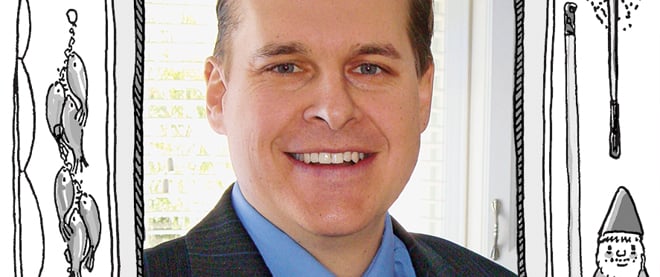Jason Richard Chenier: 1975 – 2011
Born into a mining family, it wasn’t long before he followed in his father’s footsteps. Safety was one of his main concerns.
Share

Jason Richard Chenier was born in Rouyn-Noranda, Que., on Aug. 17, 1975, to Richard, a miner, and Barbara. With “poker-straight” blond hair and big blue eyes, he was an outgoing kid, says his uncle, George Staszak. While younger sister Jennifer was the artistic one (once winning the family a trip to Ottawa with a drawing she entered in a Maclean’s contest, says George), Jason was the sporty one; often, the entire family would travel to cheer him on at out-of-town hockey games. When summer came, it was baseball, or fishing with George. If Jason didn’t like what Barbara was serving for dinner, says George, he’d “run two streets over to Granny’s house, and get fed whatever he liked there.”
In high school, Jason took summer jobs at the mine where Richard worked. He also inherited his dad’s habit of teasing people he liked, says Tracy Racine, who didn’t mind the attention. Though she was just 13 and three years behind Jason in the small English high school they attended, she couldn’t help developing a crush on the “loud” boy who was friends with her older brother, and prayed that she would one day marry him. But too soon, Jason left Quebec for Sudbury, Ont., to live with his grandmother (who’d moved) and attend Grade 13.
In 1994, Jay, as his friends had begun calling him, enrolled in Cambrian College’s mining engineering technician program. He shared an apartment with Rob Des Rivieres, who had the pleasure of being subjected to Jay’s practical jokes. One night, after drinking more than he’d planned at a keg party, Rob decided to sleep it off in his car. He awoke to find Jay had stuffed it to the roof with things from the neighbours’ yards: “Firewood, recycle boxes, garden gnomes. It was never just a low-end prank with Jay.” After they’d been in school for two years, nickel prices were surging and local mine Inco was paying for students to take the “common core” course that would certify them to work underground, says Bill Bennett, who also got to know Jay at Cambrian. Though Bill and others moved right from the course to jobs at Inco, Jay stuck with school and finished the last year of his program. By the time he graduated, the nickel market had turned down, and Jay wasn’t able to get on with Inco. He returned to Rouyn-Noranda, and worked a few short-term contracts at different mines in the area.
Back in his hometown, Jay began playing baseball with Tracy’s brother. The pair began chatting at the bar after games, and before long they had their first date—a weekend in Sudbury with Jay’s entire family for his grandmother’s birthday. “We drove there in his stinky Cutlass Supreme,” laughs Tracy. “It was a perfect weekend.”
In 2000, Jay at last got hired at Inco and moved back to Sudbury. He was joined by Tracy after their wedding in 2001. Jay did many jobs in the mine, including work as a shotcreter, spraying concrete to build up the rock walls where ore had been blasted out. Despite his easygoing personality, Jay took the dangerous nature of his work seriously, once telling Rob how unimpressed he was with a supervisor who’d offered the rest of the day off to whoever was willing to take on a risky job. “Jay would never risk himself or anyone else for the sake of production,” says Rob.
In 2003, Tracy and Jay welcomed their first child, Alexander. A girl, Danika, was born in 2005. Jay loved spending time with his kids, says Rob, and built an amazing backyard playground for them, complete with a swing set, a pool, and a sandbox he’d put together with leftover wood from work.
On June 8, Jay, who’d recently begun training to be a supervisor, was on night shift, but missed seeing his family after the school day because he went in early for a safety meeting, says Tracy. Down in the mine, Jay was working with scooptram operator Jordan Fram, 26, near an opening called an ore pass, where mined rock is dumped. With the speed of an avalanche, an unscheduled run of loose rock called muck overtook the pair, crushing them. Three backup rescue teams were brought in because the mine’s main team was at a mining rescue competition 700 km away in Marathon, Ont. (“The best of the best” are chosen to represent the mine at these events, says Bill.) Despite the rescuers’ efforts, it took them over an hour to reach Jordan and Jay, and they could not be saved. Jay was 35. A day later, the rescue team placed first in the competition, and dedicated their golden hard hats to Jordan and Jay.